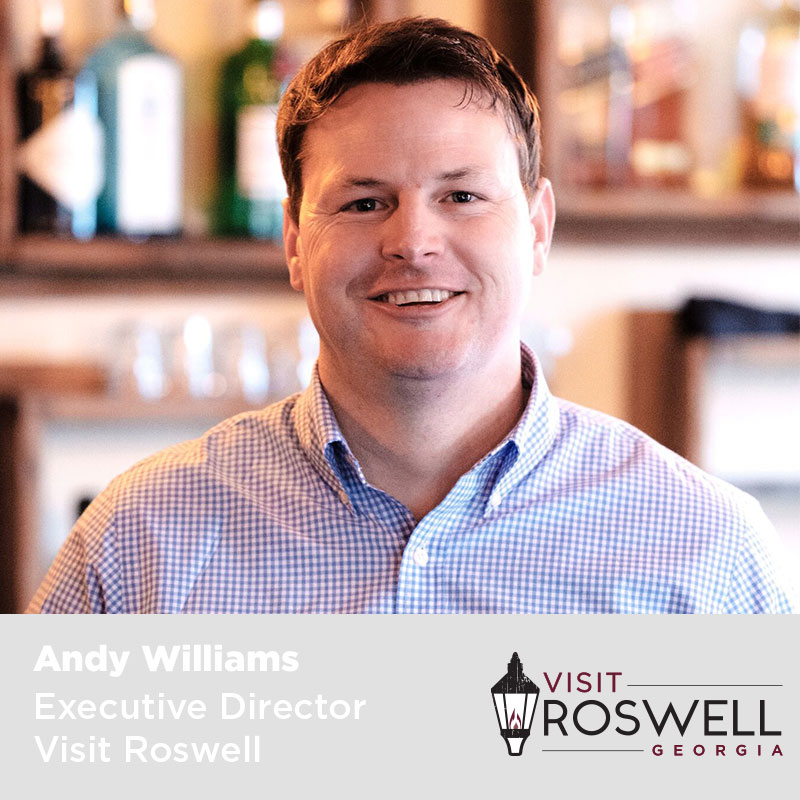

Since the launch of the Mayor’s Movie Task Force, Roswell’s film industry has been expanding, and in just the last few months, film projects in Roswell have increased ten fold! For this month’s Industry Q&A, we sat down with Andy Williams, executive director of Visit Roswell, and Mike Staples, engineer and film location specialist with Georgia Power, to discuss how their organizations work within the film industry, how the industry is growing and what this growth is doing for the local economy.
How does Visit Roswell promote the film industry and recruit film projects to the city?
Andy: First, it starts with establishing a great foundation based on a simplified process. Our process is all about immediate response, treating every production the same (regardless of size or budget), and getting relevant information into the hands of scouts or production companies as quickly as possible. Doing this creates trust and works wonders for word-of mouth-promotion and referrals throughout the industry. Many of the scouts who contact us do so because they were recommended from industry colleagues based on how smooth the process ran and how resourceful the team involved is. We’re also in close contact with the Georgia Department of Economic Development’s film office, Georgia Power, the Greater North Fulton Chamber of Commerce and other industry professionals that have the ability to send opportunities our way. Our film webpage visitroswellga.com/film also offers a great amount of detail on what we offer, and our listing on ReelScout is utilized for scouts who are seeking out film locations in Roswell. Additionally, we advertise Roswell through paid print and digital campaigns focused wholly on film, and we certainly utilize social media to showcase our efforts and create a buzz.
How does Georgia Power partner with local municipalities on film opportunities?
Mike: Georgia Power is a natural fit for the film industry. Our second-to-none Community Economic Development team assists and partners with the state’s 159 counties and municipalities on improving their infrastructure, training and workforce. This approach not only helps land large business prospects, but film industry projects as well. We use the same tools we would to land a new businesses prospect including 3D modeling, GIS Applications, and an award-winning research team. I watch film scouts’ jaws drop, for example, when we provide them all the vacant bowling alleys or former car lots from data derived from our research team. Nobody can do that!
How has the film industry changed in the last few years specifically in the state of Georgia?
Andy: Previously, it wasn’t an established focus. With the launch of the Mayor’s Movie Task Force, we have a team in place made up of key stakeholders within the City of Roswell who have the ability to get things done quickly. This makes us very appealing as a filming destination. Because of this relatively new structure, our efforts have grown substantially. We’re generating many more opportunities, landing more productions, and we’re now on the radar of a growing number of location scouts and production companies seeking out locations. Just last year, we only had two productions on the books. To-date, we have secured over 20 and continue to win productions throughout the city. We only see this industry growing in our city.
Mike: With the massive amount of content needed to fill the market’s countless channels and tastes, there is no way Los Angeles could meet the demand that Georgia has picked up. Our state has truly become the “go-to” place for film production. Georgia’s infrastructure is expanding to meet even more demand, and our efforts in film industry education are producing wonderful young talent that will fill the huge variety of jobs needed now and in the future.
How was the film industry impacted by the COVID-19 pandemic?
Mike: It slowed to a halt and slowly came back. Production is now stronger than pre-COVID. I can’t tell you how many productions I’m juggling right now because I haven’t the time to count them, and I’ll get at least two more today!
Andy: Interestingly enough, film slowed with the shutdown, then came back slowly, then quickly regained momentum, even throughout the pandemic. There was a short period of time when things went dark, but as the film office released their COVID-19 film protocols, production companies felt they had a nice guide in place to get back to business. We saw a bit of downtime back in spring of 2020, but things picked up quickly and we’re busier than ever. It’s not uncommon for our office to work three to five film leads in a week.
How many film projects has Visit Roswell worked on this year? Any specific productions you can speak about?
Andy: As of March 24, we’ve worked 79 film leads. We’ve won 23 productions. This represents an immense amount of growth year-over-year. And, we’re just getting started. While many projects we’re engaged in fall into the category of “proprietary information not to be shared,” I can say that we’ve worked on the STARZ network series Step Up, two highly successful Netflix series Ozark and Cobra Kai, commercials for Wellstar Health System and Hidden Valley dressing, music videos, and more.
How does the film industry impact the local economy?
Andy: First and foremost, it’s a revenue generator for the specific owner or operator of the location or asset being filmed. Second, film provides an opportunity for us to engage our local service providers, such as caterers. This is an area we’d really like to grow so that our local businesses benefit when productions roll into town. Third, there’s certainly economic impact when crews are here. It’s not uncommon for a crew to consist of 80+ individuals. Those crew members purchase gas, dine in our restaurants, shop with our local retailers and even stay in our hotels. Furthermore, productions oftentimes require off-duty police and fire, giving our local employees extra hours to earn income. Shifting gears a bit, we also garner media attention, which gives us the opportunity to put Roswell in the spotlight.
Mike: In many ways, some obvious, some not. In addition to staying in hotels and eating at local restaurants, film crews buy gas for their trucks, props from the shops, hardware and lumber for sets. They pay location fees, they rent parking lots for base camps, and the list goes on and on. But the biggest reason to strike gold with film is tourism. I don’t have to tell you what the “Walking Dead” did for the tiny little ghost town of Senoia. Restaurants, tour buses, shops, and employment, not to mention the local taxes that can be used to further improve the area.
How can local businesses and property owners get involved in the film industry as far as fulfilling contracts and leasing their space?
Mike: I have met countless people that share their stories on how the industry has helped them. Some rent out their homes, businesses or unique cars for filming, prop shops emerge from thrift stores or antique shops, and even dog walkers, tutors and child care providers have significantly benefited. If you have a business and want the industry to notice you, put it on the State of Georgia’s website. This is the site that all productions search to find a plethora of things from employment opportunities, catering, props or acting “extras”.
Andy: Be open and welcoming to an industry that can do great things for our community. Being thought of as film-friendly is a fantastic way to earn repeat business. If any of our residents or business owners are interested in listing homes, businesses, properties, or even services they can offer to film, I’d encourage a visit to our film webpage at www.visitroswellga.com/film. There, they can learn more about what we have to offer, as well as learn how to list on ReelScout. Our team is also available to assist with anything film related. Please reach out to me at awilliams@visitroswellga.com or to our film liaison Ted Basco at tbasco@visitroswellga.com.
